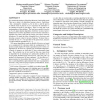Free Online Productivity Tools
i2Speak
i2Symbol
i2OCR
iTex2Img
iWeb2Print
iWeb2Shot
i2Type
iPdf2Split
iPdf2Merge
i2Bopomofo
i2Arabic
i2Style
i2Image
i2PDF
iLatex2Rtf
Sci2ools
114
click to vote
STOC
2009
ACM
2009
ACM
MaxMin allocation via degree lower-bounded arborescences
We consider the problem of MaxMin allocation of indivisible goods. There are m items to be distributed among n players. Each player i has a nonnegative valuation pij for an item j, and the goal is to allocate items to players so as to maximize the minimum total valuation received by each player. There is a large gap in our understanding of this problem. The best known positive result is an ~O( n)-approximation algorithm, while there is only a factor 2 hardness known. Better algorithms are known for the restricted assignment case where each item has exactly one nonzero value for the players. We study the effect of bounded degree for items: each item has a nonzero value for at most D players. We show that essentially the case D = 3 is equivalent to the general case, and give a 4-approximation algorithm for D = 2. The current algorithmic results for MaxMin Allocation are based on a complicated LP relaxation called the configuration LP. We present a much simpler LP which is equivalent in...
Algorithms | Complicated Lp Relaxation | Configuration Lp | Lift-and-project Inspired Lp | STOC 2009 |
| Added | 23 Nov 2009 |
| Updated | 23 Nov 2009 |
| Type | Conference |
| Year | 2009 |
| Where | STOC |
| Authors | MohammadHossein Bateni, Moses Charikar, Venkatesan Guruswami |
Comments (0)

